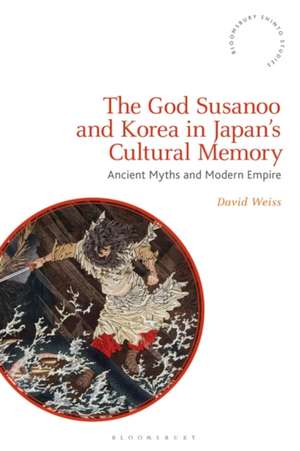The God Susanoo and Korea in Japan’s Cultural Memory: Ancient Myths and Modern Empire: Bloomsbury Shinto Studies
Autor David Weissen Limba Engleză Hardback – 12 ian 2022
| Toate formatele și edițiile | Preț | Express |
|---|---|---|
| Paperback (1) | 191.85 lei 6-8 săpt. | |
| Bloomsbury Publishing – 23 aug 2023 | 191.85 lei 6-8 săpt. | |
| Hardback (1) | 540.23 lei 6-8 săpt. | +115.58 lei 6-12 zile |
| Bloomsbury Publishing – 12 ian 2022 | 540.23 lei 6-8 săpt. | +115.58 lei 6-12 zile |
Preț: 540.23 lei
Preț vechi: 773.94 lei
-30% Nou
103.37€ • 112.64$ • 87.11£
Carte tipărită la comandă
Livrare economică 24 aprilie-08 mai
Livrare express 19-25 martie pentru 125.57 lei
Specificații
ISBN-10: 1350271187
Pagini: 256
Dimensiuni: 156 x 234 x 24 mm
Greutate: 0.54 kg
Editura: Bloomsbury Publishing
Colecția Bloomsbury Academic
Seria Bloomsbury Shinto Studies
Locul publicării:London, United Kingdom
Caracteristici
Notă biografică
David Weiss is an Assistant Professor at Rikkyo University, Japan.
Cuprins
List of TablesConventionsIntroductionPart I. BLURRED BOUNDARIES AND LIMINAL IDENTITIES1. A Foil to Set Off the Sun Goddess: Susanoo in the Ancient Sources2. Passion for Transgression: Susanoo's Liminal Character3. At the Margin of the Divine Country: Korea in Japanese Cultural ImaginationPart II. POLITICAL MYTHOLOGY: A GENEALOGY OF SUSANOO'S CONNECTION TO KOREA4. "I do not want to Stay in this Land": Susanoo's Sojourn to Korea in the Ancient Court Chronicles5. The God with a Thousand Faces: Susanoo and His Alter Egos in Medieval Mythology6. Korea as a Realm of Death: Susanoo and Korea in Modern DiscoursesEPILOGUE: After the War: Susanoo in Scholarship, Tourism, and Popular CultureBibliographyIndex
Descriere
This book is available as open access through the Bloomsbury Open Access programme and is available on www.bloomsburycollections.com.This book discusses how ancient Japanese mythology was utilized during the colonial period to justify the annexation of Korea to Japan, with special focus on the god Susanoo. Described as an ambivalent figure and wanderer between the worlds, Susanoo served as a foil to set off the sun goddess, who played an important role in the modern construction of a Japanese national identity. Susanoo inhabited a sinister otherworld, which came to be associated with colonial Korea. Imperialist ideologues were able to build on these interpretations of the Susanoo myth to depict Korea as a dreary realm at the margin of the Japanese empire that made the imperial metropole shine all the more brightly. At the same time, Susanoo was identified as the ancestor of the Korean people. Thus, the colonial subjects were ideologically incorporated into the homogeneous Japanese "family state".The book situates Susanoo in Japan's cultural memory and shows how the deity, while being repeatedly transformed in order to meet the religious and ideological needs of the day, continued to symbolize the margin of Japan.
Recenzii
David Weiss has tackled the long overdue task of heaping Amaterasu's 'shady' brother out of the shadows, arguing for his importance not only in Japanese mythology and Shinto, but also for political purposes under Japanese Imperialism. Uncovering the 'Korean link' of Susanoo together with his representations and interpretations not only benefits scholars, but it also supplies under- and postgraduate students with an authoritative introduction to Susanoo and the diverse roles he plays in Japan's cultural memory.









